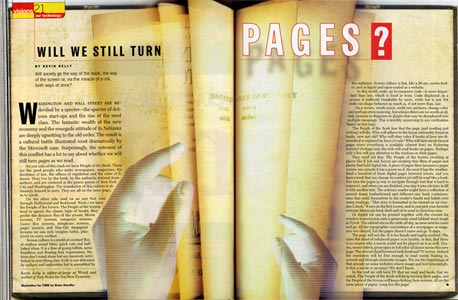 |
|
 |


Will We Still Turn Pages
Time Magazine
June 19, 2000 Washington and Wall Street are bedeviled by a specter--the specter of dotcom start-ups and the rise of the nerd class. The fantastic wealth of the new economy and the renegade attitude of its Netizens are deeply upsetting to the old order. The result is a cultural battle illustrated most dramatically by the Microsoft case. Surprisingly, the outcome of this conflict has a lot to say about whether we will still turn pages as we read.
On one side of this clash we have People of the Book. These are the good people who make newspapers, magazines, the doctrines of law, the offices of regulation and the rules of finance. They live by the book, by the authority derived from authors, and are centered at the power points of New York City and Washington. The foundation of this culture is ultimately housed in texts. They are all on the same page, so to speak.
On the other side (and on an axis that runs through Hollywood and Redmond, Wash.) we have the People of the Screen. The People of the Screen tend to ignore the classic logic of books; they prefer the dynamic flux of the screen. Movie screens, TV screens, computer screens, Game Boy screens, telephone screens, pager screens and Day-Glo megapixel screens we can only imagine today, plastered on every surface.
Screen culture is a world of constant flux, of endless sound bites, quick cuts and half-baked ideas. It is a flow of gossip tidbits, news headlines and floating first impressions. Notions don't stand alone but are massively interlinked to everything else; truth is not delivered by authors and authorities but is assembled by the audience. Screen culture is fast, like a 30-sec. movie trailer, and as liquid and open-ended as a website.
In this world, code--as in computer code--is more important than law, which is fixed in texts. Code displayed on a screen is endlessly tweakable by users, while law is not. Yet code can shape behavior as much as, if not more than, law.
On a screen, words move, meld into pictures, change color and perhaps even meaning. Sometimes there are no words at all, only pictures or diagrams or glyphs that may be deciphered into multiple meanings. This is terribly unnerving to any civilization based on text logic.
The People of the Book fear that the page (and reading and writing) will die. Who will adhere to the linear rationality found in books, new and old? Who will obey rules if books of laws are diminished or replaced by lines of code? Who will turn nicely bound pages when everything is available (almost free) on flickering screens? Perhaps only the rich will read books on paper. Perhaps only a few will pay attention to the wisdom on their pages.
They need not fear. The People of the Screen (working at places like E Ink and Xerox) are creating thin films of paper and plastic that hold digital ink. A piece of paper then becomes a paper screen: one minute it has a poem on it, the next it has the weather. Bind a hundred of these digital pages between covers, and you have a book that can change its content yet still be read like a book. You turn the pages (a way to navigate through text that is hard to improve), and when you are finished, you slap it into a holster to fill it with another text. The ordinary reader might have a collection of several dozen leatherbound and different-size book containers, ones that mold themselves to the reader's hands and habits over many readings. "This story is formatted to be viewed on an oversize L book," it says on the first screen, and so you pick your favorite oversize Moroccan book shell and sit to read in luxurious ease.
Or digital ink can be printed together with the circuits for wireless transmission onto a generously sized tabloid sheet tough as Tyvek. The tabloid sits on the table all day, as news articles come and go. All the typographic conventions of a newspaper or magazine are obeyed, but the paper doesn't come and go. It stays.
The page will not die. It is too handy and highly evolved. The same flat sheet of enhanced paper is so nimble, in fact, that there is no reason why a movie could not be played on it as well. Drama, music videos, great epics in full color all dance across this new page. The eternal sheaf becomes both book and TV screen. Indeed the resolution will be fine enough to read words floating in, around and through cinematic images. We see the beginnings of that already on some websites where image and text intermingle. Is this a movie or an essay? We don't know.
In the end we will have TV that we read and books that we watch. The People of the Book will keep turning their pages, and the People of the Screen will keep clicking their screens. All on the same piece of paper. Long live the page!
Kevin Kelly is editor-at-large at Wired and author of New Rules for the New Economy
|
 |

